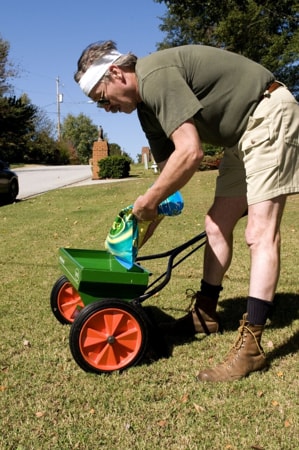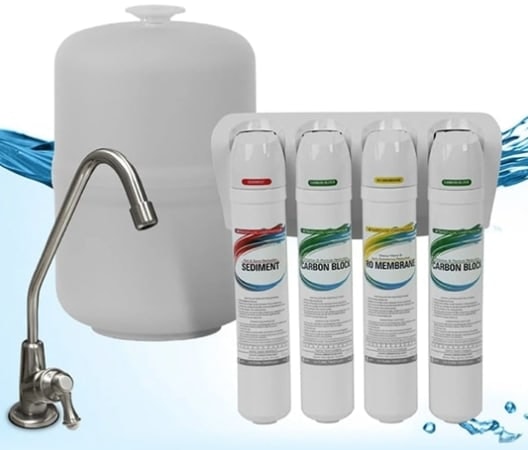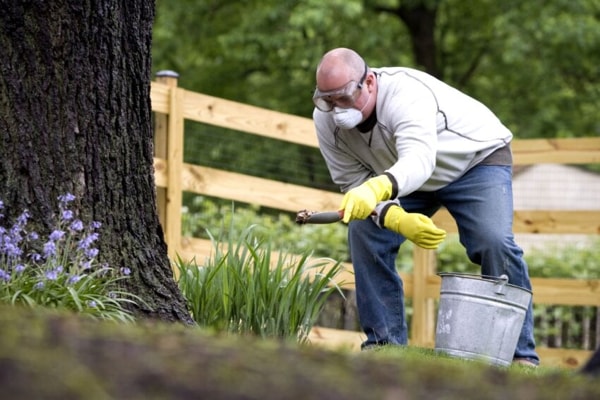It depends on the type of fertilizer and how you use it. Organic lawn fertilizers are safe for well water. A high-end organic fertilizer releases and breaks down over time. Organic fertilizers are made of products like manures, powdered rocks, blood meal, bone meal, wood ash, and compost.
What is the Right Way to Use Lawn Fertilizers if you own a Private Well?

The government of Texas has laid out some basic principles that can help private well owners use lawn fertilizers safely and limit contamination. Here are the key points outlined in the guidelines
- Distance between the fertilizer storage facility and water well
- Fertilizer preparation site
- Fertilizer disposal system
- Soil testing
Let’s discuss them in detail to minimize contamination due to fertilizer use.
Distance between Fertilizer Storage Facility and Water Well
The minimum recommended distance between a fertilizer storage facility and a water well is 150 feet. Moreover, the storage facility must be built downslope. You may need to build a new one or modify your existing fertilizer storage facility to reduce contamination risk.
- Ensure that road access can accommodate deliveries and emergency equipment.
- Store dry and liquid products separately; use pellets for fertilizer bags.
- The storage area must be big enough to confine 125% of the volume of the largest container plus 100% of the volume of all storage tanks.
- Use impermeable drainage pads and a sump basin to collect liquid, so any leakage doesn’t result in well water contamination through seeping.
- Keep the facility locked to avoid unwanted access.
Fertilizer Preparation Site
Another way to minimize fertilizer contamination is safe preparation. Leakage at the same place consistently can lead to groundwater contamination via seepage. You must clean up spills according to the instructions provided by the manufacturer.
- Avoid working with chemicals near your water well; use a designated water tank to transfer water to the preparation site.
- Change the mixing site location every 6-12 months to prevent spillage at one particular point.
- Avoid mixing and preparing fertilizers on gravel driveways or surfaces that allow spills to move quickly into the soil.
- Always leave a 6 inches air gap between the water hose and the top of the sprayer tank.
- Transfer liquid chemicals in closed containers from the storage site to the application site to avoid spillage.
Fertilizer Disposal System
How you dispose of your fertilizers can also lead to well water contamination. Burning fertilizer bags is illegal in many states. Here’s what you can do for safe disposal.
- Buy large-size containers/bags to minimize the number of containers.
- Buy chemicals in returnable containers if possible.
- Triple-rinse the containers and dispose of the rinse water carefully.
Soil Testing
Soil testing is critical for avoiding fertilizer contamination. The most important factors here are the rate and timing of fertilizer application.
- Test your soil annually to determine the appropriate application rate of nitrogen fertilizer. It is economical and eco-friendly.
- Over-application leads to quick groundwater pollution. Match the fertilizer application rate with the expected crop yield.
Why are Lawn Fertilizers bad for Well Water?
Nitrate is a key component in most lawn fertilizers. Nitrates are highly soluble in water and easily leach down the soil, contaminating well water. Higher levels of nitrates in well water can cause birth defects, blue baby syndrome (in children below 6), thyroid diseases, and increase the risk for certain diseases.
EPA has set the maximum contaminant level (MCL) at 10 mg/L for nitrate.
How to know if my Well Water is Contaminated with Lawn Fertilizer?
You’ll have to test your water to check if nitrate levels have gone up due to lawn fertilizer. EPA recommends annual testing for all private well owners regardless they use lawn fertilizers or not.
SpringWell’s water testing kit is recommended to test for nitrates and lawn fertilizer contamination in well water. It is one of the best on the market and can test up to 53 contaminants in well water.
How can I remove Lawn Fertilizer from my Well Water?
Lawn fertilizer contains nitrates that are difficult to remove. They cannot be removed with sediment or carbon filters, ultrafiltration systems, or UV filters. You will need to install a reverse osmosis water filter to remove nitrates to make water safe for drinking. The CDC recommends using RO filters, distillation or ion exchange filters. The problem with distillation is that it cannot produce enough water to meet the needs of a large family. Ion exchange filters effectively remove nitrates but cannot remove TDS, heavy metals, and other contaminants commonly found in well water. Hence a reverse osmosis filter is best for removing nitrates from drinking water.
Recommended Reverse Osmosis Filter: SpringWell’s Reverse Osmosis Filter

It is best for homes using lawn fertilizers. It can remove nitrates, arsenic, fluoride, TDS, heavy metals, sediment, microorganisms, and odors from well water. The unit consists of a sediment filter, two carbon filters, and an RO membrane. The RO membrane can remove contaminants as small as 0.0001 microns.
SpringWell’ RO system can filter up to 75 gallons of water daily and comes with a pressurized tank to store water.
What Safety Measures do I need to take while using Lawn Fertilizers?

- Use a hose with the anti-siphon device to avoid backflow to your well water.
- Rinse equipment and dispose of rinse water over your lawn.
- Follow directions on the packing for safety precautions while mixing and spraying.
What can I do to reduce Lawn Fertilizer Application?
- Keep your lawn well maintained to avoid weed growth; cut your grass 2-3 inches long with a sharp blade.
- Avoid watering your lawn frequently, but water deeply to promote deep root growth, so grass doesn’t die or brown out during winters.
- Grow native grass and shrubs because they are better adapted to conditions in your area.
- Use alternatives to fertilizers.
